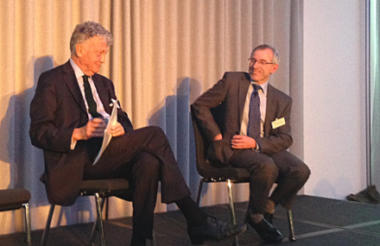William Shawcross, the outgoing chair the Charity Commission, has said that pressure on the sector’s finances is likely to be the greatest challenge in the future.
He was speaking at the Charity Finance Summit, organised by Civil Society Media, yesterday where he said that pressure on finances is the biggest problem facing the sector.
Shawcross was being interviewed by Andrew Hind, director and executive editor of Civil Society Media and former chief executive of the Charity Commission, and reflected on his time at the helm of the regulator.
After saying that finances were likely to be the sector’s biggest challenge, he said: “Those charities that depend on government grants are already finding that there are less grants and more contracts.”
He added that “Fundraising is more difficult, partly as a result of the awful fundraising scandal which began with Olive Cooke.”
But he praised the way the sector had responded to the fundraising crisis, and said the new system was “rather effective”.
High pay ‘does risk alienating donors’
Shawcross also said he stood by comments he made in 2013, relating to levels of senior executive pay.
In an interview with the Telegraph in 2013 Shawcross said that charities needed to be able to justify high pay. The comments came at a time when there were a number of critical stories about charity executive pay in the national media and some commentators in the sector felt Shawcross’ intervention was unhelpful.
Yesterday he said that his point had been that very high levels of pay “does risk alienating donors” and it is something for trustees to be aware of.
“People putting £5 in a tin don’t want to think of a large proportion of it going to pay the chief executive’s salary,” he said.
He added that: “For charities transparency is more important than it is for other organisations.” And said: “Donors deserve to have openness.”
Shawcross also stood by previous comments about the risk extremism poses to the sector.
“Extremist abuse is not the most widespread but it is potentially the most deadly,” he said, and that is the regulator’s “job to protect you”.
‘Important that the sector is seen to be well regulated’
Shawcross also told delegates that it is important for the sector to be “seen to have effective regulation”.
He reminded delegates that shortly after becoming the chair he had been “hauled” before the Public Accounts Committee, and its chair, the Labour MP Margaret Hodge, had said the regulator was “unfit for purpose” and threatened to “put it on the bonfire”.
This meant that the Commission was under pressure to “prove we were not unfit,” he said and that is why the regulator had focused on its role “promoting public trust and confidence”.
He added that: “It has been rough seas but I hope it is calmer now.”
There were frequent mentions of the regulator’s budget having been cut significantly in 2010 and he warned that more “salami slicing” would damage its ability to do its job.
Shawcross still believes that introducing charging system for larger charities is the best way forward, and said this could be used to fund “support services” for the sector that were previously provided by the regulator “automatically”.
‘Governance is crucial’
Responding to a question about the benefits of unitary boards, where senior executives are also trustees, Shawcross said that it was difficult as “trustees are there to control the executive”.
“If it is a big organisation governance is crucial and where we have seen charities fail often governance has been bad,” he said.
He added that there is a “danger” if the “relationship [between trustees and executive leaders] become too close”.
“Trustees must be in overall control of the whole organisation,” he said.
‘Rewarding experience’
Shawcross said that his five years a chair had been a “rewarding experience” and that he had learnt a lot.
“It has been the best, most interesting, five years,” he said and that he felt “very lucky to have been given this job”.
He said what struck him was the “extraordinary enormity” of the sector.
|









